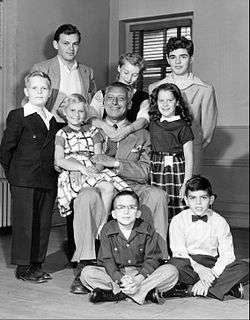Bonino (TV series)
| Bonino | |
|---|---|
 Cast of the show. | |
| Starring |
Ezio Pinza Mary Wickes Chet Allen Van Dyke Parks David Opatoshu Conrad Janis Mike Kellin Lenke Peterson |
| Country of origin | United States |
| No. of seasons | 1/2 |
| No. of episodes | Unknown; no more than 16 |
| Production | |
| Running time | 30 minutes |
| Release | |
| Original network | NBC |
| Picture format | Black and white |
| Original release | September 12 – December 26, 1953 |
Bonino is an ethnic situation comedy television series starring Ezio Pinza (1892-1957) as an Italian-American opera singer trying to rear his six children after the death of their mother. The program aired on live NBC from September 12 to December 26, 1953.
Pinza's character is named Babbo Bonino. Character actress Mary Wickes (1910-1995) portrayed Martha the housekeeper, a role which she filled over the years in numerous other series. The actors portraying the children were Conrad Janis (born 1928), later of ABC-TV's sitcom Mork & Mindy, as eldest son Edward, Lenka Peterson (born 1925) as older daughter Doris, Chet Allen (1939-1984) as Jerry; Oliver Andes as Carlo, Gaye Huston as Fancesca, and Van Dyke Parks (born 1943) as Andrew, the youngest. Allen had earlier appeared as Amahl in Gian Carlo Menotti's Amahl and the Night Visitors on NBC's Hallmark Hall of Fame in 1951-1952. Parks, who grew up in Lake Charles, Louisiana, became a rock-music producer and composer who cowrote with Brian Wilson the Beach Boys' hits "Heroes and Villains" and "Surf's Up".[1]Mike Kellin (1922-1983), who was cast the following year in Celeste Holm's short-lived CBS sitcom Honestly, Celeste!, appeared in the role of Rusty.
David Opatoshu (1918-1996), portrayed Walter Rogers, Babbo's agent, who tries to convince him to return to singing. As each episode unfolds, Bonino realizes that his children are more independent than he thought. Pinza sang in each episode.[2]Anthony Eisley (1925-2003), later of ABC's detective series Hawaiian Eye, guest starred in Bonino as John Clinton.[3]
Bonino aired at 9 p.m. Eastern on Saturday before Ted Mack's The Original Amateur Hour. Its principal competition was The Jackie Gleason Show on CBS.[4]
There was also an Ezio Pinza Show on NBC in 1952 which alternated at the 8 p.m. Friday slot with The RCA Victor Show with Dennis Day, subsequently renamed The Dennis Day Show in the 1953-1954 season.
References
- ↑ Alex McNeil, Total Television, New York: Penguin Books, 1996, p. 111
- ↑ IMDB, Bonino: http://www.imdb.com/title/tt0045374/plotsummary
- ↑ IMDB, Anthony Eisley: http://www.imdb.com/name/nm0252111/
- ↑ 1953-1954 American network television schedule
External links
- Bonino at the Internet Movie Database